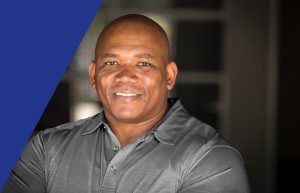D.O.P.E. Spotlight Interview – Stan Campbell

Spotlight On Stan Campbell, Lead Instructor D.O.P.E.
Making a Difference Behind the Badge
It sounds a little strange to hear a man who carried a badge for 21 years say he didn’t like police growing up. “Living in Newark, New Jersey, we had a rollercoaster ride reference to the relationship between police and citizens.” Stan understood the need for police, “but I didn’t run into a lot of friendly ones.”
Nonetheless, Stan always saw himself as a protector. He looked out for his friends and cousins. He said there were known predators in the neighborhoods where he grew up, and he felt a responsibility to prevent young people from being brutalized or abused. At the age of 21, Stan relocated to Oklahoma City where the pace was a little slower, and he met a few police officers that helped change his opinion of those who wear the badge. They told Stan they thought he’d make a great police officer. He talked it over with his family and then walked into his local police recruiting office and filled out an application. He got the job.
It was 1991, and there was widespread public outrage over the beating of Rodney King. “I felt like it was volunteering to be the boogeyman because everybody seemed to hate police at that time,” Stan says; however, he felt any real reform had to come from within a law enforcement agency, and he saw himself as “stepping behind enemy lines” to make a difference.
Once on the force, Stan found the majority of law enforcement officers were of strong character and saw that they had good intentions. He also encountered a few men and women of bad character, people who, in Stan’s opinion, “slipped through the cracks, who really didn’t deserve the job, who worked their way into a place of influence where they could corrupt other officers.”
Stan found that Field Training Officers, the men and women who show new officers the ropes, have an outsized influence on establishing the culture of a law enforcement agency. He earned his certification as a Field Training Officer, then he became a supervisor, and he spent much of his career with the Oklahoma City Police Department leading by example and helping to nurture new officers in the Field Training Program.
Citizen Advocate
In the years following Stan’s 2012 retirement from law enforcement, stories about police brutality have dominated the headlines. Several activist groups raised awareness of how people of color are disproportionately victims of police brutality. As a black man raising a son, Stan understood the outrage. As a veteran of law enforcement and police trainer, Stan knew firsthand that police officers put their lives on the line and have to make difficult life-or-death decisions as part of their jobs.
“To be open and empathetic to both sides, I don’t hashtag ‘Black Lives Matter.’ I don’t hashtag ‘Blue Lives Matter.’ I don’t attach myself to either group, purposely staying neutral.” Stan says, “Because once you fly the flag of your particular tribe, that becomes the focus of your mission. I believe that if each person, a law enforcement officer and a citizen, says that the other’s life matters, we will move a lot faster in the right direction than if everybody is just embracing their own group.”
Stan believes that both parties in a law enforcement encounter have a responsibility to de-escalate the situation. “Law enforcement officers need to be held to a higher standard,” Stan says, “but it takes two people to have a conflict and to de-escalate.”
Stan acknowledges that it’s not fair or reasonable to put the onus on the victims of police brutality, especially in cases where police abuse their power and violate someone’s civil rights, but Stan wants people to be able to defuse and survive an encounter so they can live to hold bad-actors accountable in the proper venue.
“No one should think having their name on a memorial T-shirt at a protest is how they can make a difference,” Stan says. “We want you to live so you can stand up for yourself later. You can’t file a complaint if you’re dead.”
Founding D.O.P.E. the Movement
In 2016, Stan founded D.O.P.E. which stands for De-escalating Officer Patrol Encounters. The goal of the organization is to present solutions to both police and citizens so that everyone goes home alive after a law enforcement encounter. While the effort includes outreach to law enforcement agencies, much of D.O.P.E.’s mission involves educating citizens regarding their legal rights and obligations during a police encounter, teaching them how to make the officer feel safe to decrease anxiety, and giving them tips on how to seek redress if an officer violates their rights.
As part of D.O.P.E., Stan has developed a mobile app that provides content designed to help people understand their rights and to give them the tools for lowering the tension during a law enforcement encounter. Stan says, “Many families have to have ‘the talk’ with their kids, to discuss how to safely make it through interactions with people of authority,” Stan says. “One of the things I hope the Police Encounter app does is help parents guide those conversations and give young people good information.”
Stan also designed the app to allow citizens to document a police encounter when they feel their rights are being violated. “Advanced users will be able to record an encounter,” Stan says, “and even if their phone is confiscated, as soon as the recording stops, it is automatically uploaded to our private servers and sent to three of the user’s chosen emergency contacts.”
Stan is of the opinion that the number of deadly police use of force incidents has not changed significantly in the last eight (8) years, but that the advent of the smartphone has helped raise awareness. “There is a reason some people distrust law enforcement if you study the history which documents police corruption in major cities,” Stan says. “And as long as people keep dying at the hands of the police unnecessarily, that trust gap will keep widening. One of the most significant things that could be done to close that gap is to reduce the number of police shootings, and the best way to do that is to increase training on both sides. This should include working with law enforcement and educating citizens on how to de-escalate these encounters.”
 SHAWN VINCENT – LITIGATION CONSULTANT
SHAWN VINCENT – LITIGATION CONSULTANT
Shawn Vincent is a litigation consultant who helps select
juries in self-defense cases, and he manages public interest
of high-profile legal matters. If you have any questions for
Shawn, or would like topic specific articles, please send your
request to dopethemovementinfo@gmail.com attention Shawn Vincent Articles.


